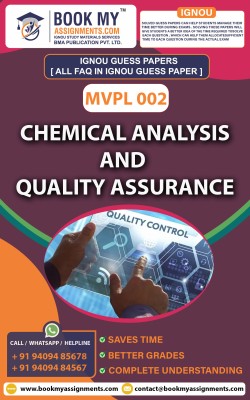IGNOU MVPL 002 Chemical Analysis and Quality Assurance | Guess Paper | Important Question Answer |Master of Science in Food Safety and Quality Management (MSCFSQM)(Paperback, BMA Publication)
Quick Overview
Product Price Comparison
Introduction to Chemical Analysis in Food Quality Assurance:Overview of the role of chemical analysis in ensuring the safety, quality, and compliance of food products.Understanding the principles, objectives, and benefits of chemical analysis in food quality assurance.Chemical Composition of Food:Study of the chemical composition of major components in food, including macronutrients (carbohydrates, proteins, fats), micronutrients (vitamins, minerals), water, and additives.Understanding the methods and techniques used to analyze the chemical composition of food.Instrumental Analysis Techniques:Introduction to instrumental analysis techniques used in food quality assurance, including spectroscopy (UV-Vis, FTIR, NMR), chromatography (HPLC, GC), mass spectrometry (MS), and atomic absorption spectroscopy (AAS).Understanding the principles, instrumentation, and applications of each technique in food analysis.Chemical Methods of Food Analysis:Overview of chemical methods used to analyze specific components and contaminants in food, including moisture content, ash content, pH, acidity, alkalinity, and water activity.Understanding the principles, procedures, and limitations of chemical methods of analysis.Nutritional Analysis of Food:Study of methods used to analyze the nutritional content of food, including proximate analysis, vitamin analysis, mineral analysis, and amino acid analysis.Understanding the principles, techniques, and regulations governing nutritional analysis in food products.Analysis of Food Additives and Contaminants:Examination of methods used to analyze food additives, preservatives, colorants, flavorings, and other food ingredients.Study of techniques for detecting and quantifying contaminants in food, including pesticides, heavy metals, toxins, and allergens.Quality Parameters and Specifications:Identification of quality parameters and specifications used to assess the safety, quality, and acceptability of food products.Understanding of quality assurance standards, specifications, and tolerance limits for various food components and contaminants.Validation and Verification of Analytical Methods:Validation of analytical methods to ensure their accuracy, precision, specificity, and reliability.Verification of analytical methods through proficiency testing, inter-laboratory comparisons, and method validation studies.Quality Control and Assurance in Chemical Analysis:Implementation of quality control measures to ensure the reliability and consistency of analytical results.Understanding of quality assurance principles, documentation, and regulatory requirements in chemical analysis.Data Analysis and Interpretation:Techniques for analyzing and interpreting analytical data, including statistical analysis, data visualization, and trend analysis.Understanding of data integrity, traceability, and reporting requirements in chemical analysis.

